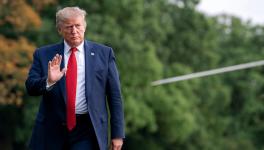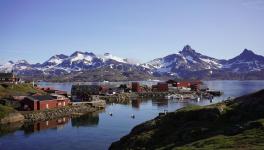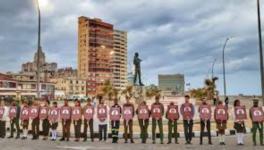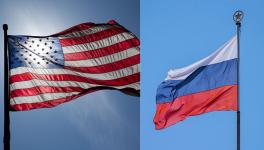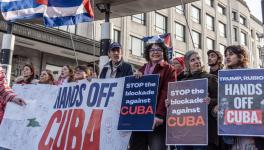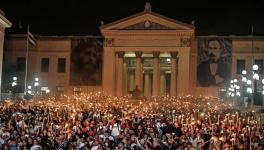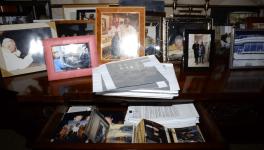The Trump-Putin Meet and the Chorus of Disapproval
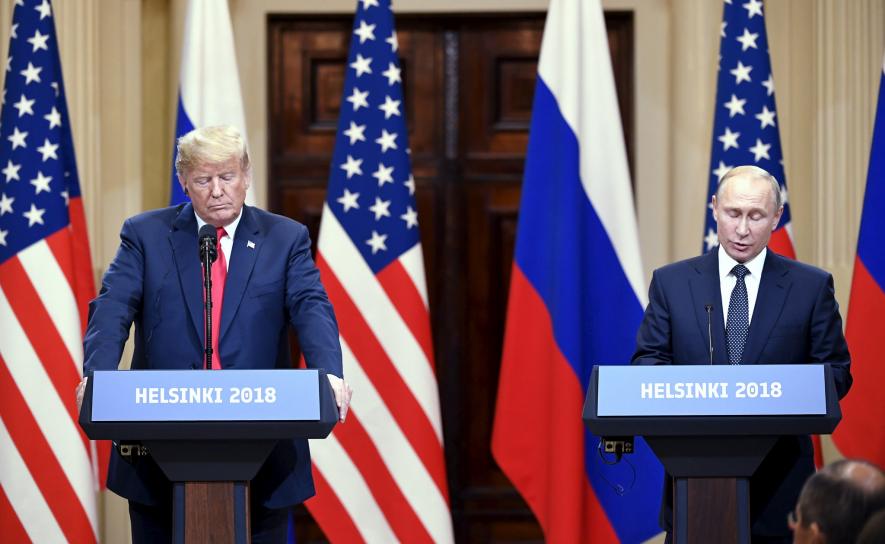
The past one week saw dramatic developments with global implications as US president Donald Trump and Russian president Vladimir Putin met in Helsinki, Finland, on June 16 to discuss the possibilities of improving the relationship between the two countries. In the meeting, the contentious issues of Crimea, Syria and Iran were discussed, while allegations of Russian involvement in the hacking of the Democratic National Committee (DNC) servers during the 2016 US elections were countered by Putin. Also on the agenda was the control of the arms race between the countries.
The meeting did not technically qualify as a summit though, as there was no joint statement or predetermined policies that were to be pursued.
The meeting took place despite numerous attempts by the US establishment to derail it. Only days before the meet, Special Counsel Robert Mueller indicted 12 Russian nationals in the DNC hacking case without revealing any evidence to back his indictment, after which the Democratic party called on Trump to boycott the meet. This is despite the fact that numerous polls have shown that a majority of the Americans do not find the so-called ‘Russiagate’ issue to be of any real relevance.
Also Watch: The Putin-Trump Meet and the Collapse of Politics in the US
While the US media was worried that an ill-prepared Trump might capitulate before Putin’s demands at the cost of America’s interests, European leaders were worried the two presidents might strike a deal beneficial to their countries but hurting European interests. In the latter case, the fears were accentuated by Trump’s belligerent tone at the NATO meeting last week.
Last Wednesday, Trump startled NATO Secretary-General Jens Stoltenberg by accusing Germany of being “totally controlled by Russia”, while complaining about the approval Germany had given in April to the construction of Nord Stream 2 gas pipeline.
A day after expelling four Russian diplomats over the UK's allegations that Russian agents had poisoned a former spy using a nerve agent, Germany had given an approval for Russian energy company Gazprom’s 9.5 billion euro project which, once complete, will carry 55 billion cubic meters of gas each year from Russia to Germany from under the Baltic sea. Trump complained it was “inappropriate” that while the US was “protecting” the EU states from Russia, “numerous countries go out and make a pipeline deal with Russia where they’re paying billions of dollars into the coffers of Russia.”
The following day, at the NATO summit, Trump demanded that the allies increase their contribution to the NATO to 4% of their respective GDPs, and threatened to pull US out of the alliance, should they fail to do so.
From Brussels he went to the UK on Friday, where he embarrassed his host, Prime Minister Theresa May, by giving an interview to the Sun in which he told that her rival Boris Johnson “would be a great Prime Minister” and complained that May was being weak in negotiating Brexit with the EU.
Further exacerbating the tense atmosphere, Trump, one day before meeting Putin, in an interview with CBS at his golf resort, when asked who was US's “biggest foe globally right now", told the interviewer: “I think the European Union is a foe, what they do to us in trade. Now, you wouldn't think of the European Union, but they're a foe. Russia is foe in certain respects. China is a foe economically, certainly they are a foe. But that doesn't mean they are bad. It doesn't mean anything. It means that they are competitive.”
He further added that the European countries “had advantage of us and many of those countries are in NATO and they weren't paying their bills and, you know, as an example a big problem with Germany. Because Germany made a pipeline deal with Russia.”
Protests greet Trump
At Helsinki, Trump was greeted with massive protests. “Warm our hearts, not our planet” said one of the billboards, targeting Trump's climate-change denial and his pulling out of the Paris agreement on climate change. “Blessed be the Migrant child”, read a placard, protesting the US policy in accordance with which, until recently, the children of irregular immigrants were forcibly separated from their parents.
The newspaper, Helsingin Sanomat, campaigning for press freedom, placed 300 different posters along the route from airport to the presidential palace where the meeting was scheduled, with slogans highlighting the two presidents’ “turbulent relations with the media”. “Trump calls media enemy of the people” said a headline from last year on one of the posters. “Putin shuts down Russia's largest news agency” was another headline from 2013 carried on a different poster.
“In Russia, the freedom of the press has become almost non-existent during the reign of Putin. In the Reporters Without Borders World Press Freedom Index, Russia is ranked 148” among 180 countries, stated a press-r target="_blank" rel="nofollow"elease by Helsingin Sanomat, which added that the US stood at the 45th position.
On the morning of the summit, Trump tweeted, “Our relationship with Russia has NEVER been worse thanks to many years of U.S. foolishness and stupidity and now, the Rigged Witch Hunt!”, referring to Mueller’s indictment. Russia’s foreign ministry shared the tweet with a comment that read “We agree”. This was the beginning of a series of events which united various sections of the US political establishment against Trump.
The meet started off with the two leaders making press statements. Trump congratulated Putin on successfully hosting the FIFA world cup, and said “Getting along with Russia is a good thing and not a bad thing. I really think the world wants to see us get along."
After an hour-and-a-half-long personal interaction between the two presidents - accompanied only by their translators - followed by a meeting with the teams accompanying them, the anticipated joint press conference began, but not before a reporter from The Nation was removed from room, presumably for holding a hand-made placard that read “Nuclear Weapon Ban Treaty”.
Putin, in his opening remarks, said that the meeting with Trump took place in a “frank and business-like atmosphere”, going on to say, “It’s quite clear to everyone that the bilateral relationship is going through a complicated stage, and yet those impediments, the current tension.. essentially have no solid reason behind it. The Cold War is a thing of past, the era of acute ideological confrontation of the two countries is a thing of remote past”.
Highlighting the need to deepen the interaction between the two countries on disarmament, Putin pointed out that it was necessary to extend the Strategic Arms Reduction Treaty - one of the nuclear arms reduction treaty signed between the two countries which is set to expire in 2021 - and to properly implement INF treaty, which covers ballistic and cruise missiles that are armed with nuclear as well as conventional weapons. “And, of course, the agenda of non-placement of weapons in space,” he added.
Pointing out that the US and Russia had in the past worked together successfully in countering terrorism, Putin also called for re-establishing “the working group on anti-terrorism”.
Touching upon the volatile situation in Syria, Putin said that, "Both Russian and American military have acquired the useful experience of coordination of their action, established the operational channels of communication which permit it to avoid dangerous incidents and unintentional collisions in the air and in the ground,” adding that the “south of Syria should be brought to the full compliance with the treaty of 1974 as far as the separation of forces of Israel and Syria is concerned. This will bring peace to Golan Heights, and bring more peaceful relationship between Syria and Israel..”
After appreciating President Trump for engaging with North Korea, Putin took a dig at him for pulling out of the Iran nuclear deal, saying, “Let me remind you that thanks to the Iranian nuclear deal, Iran became the most controlled country in the world. It effectively ensured the exclusively peaceful nature of Iranian nuclear program and strengthened the nonproliferation regime.”
Ukraine was another heated issue on which Trump was expected to push Putin. Acknowledging that the issue was discussed in the meeting, Putin stressed on the need for Kiev to implement the Minsk Agreements, and urged the US to use its influence to nudge the Ukrainian state to that end.
The presidents also agreed to set up “a high-level working group” to bring together the leading businessmen of the two countries.
Finally, before handing over the stage to Trump, Putin touched upon the subject that had been haunting the US establishment for months - the alleged Russian meddling in the 2016 American election. “Once again, President Trump mentioned the issue of the so-called interference of Russia with the American elections, and I had to reiterate.. that the Russian state has never interfered and is not going to interfere in internal American affairs, including election process,” Putin said.
Following Trump’s remarks, a journalist asked Putin, “Why should President Trump believe your statement that Russia did not intervene in the 2016 election, given the evidence that U.S. intelligence agencies have provided? And will you consider extraditing the 12 Russian officials that were indicted last week by a US grand jury?”
Putin responded by first hinting that it was only natural that he would be more sympathetic to Trump, who has, since his campaign, been pushing for normalizing ties between the two countries, as opposed to Hillary Clinton, who was determined to follow a policy that would have put the two countries on a collision course. He then asked the journalist if there was any single fact that would definitely prove collusion between the Trump campaign and Russia,
With regards to the indictment of the 12 Russians by Robert Mueller, Putin pointed out that there was already an existing treaty between the US and Russia dating back to 1999, called “The Mutual Assistance on Criminal Cases”, in accordance with which, if the US sent an official request, Russia could interrogate the specific individuals named by Mueller and provide the US with the relevant materials.
He also went one step further and offered to “permit official representatives of the United States, including the members of this very commission headed by Mr. Mueller” into the country so they could attend the questioning.
However, to avail of this offer, Putin added, the US would have to reciprocate by interrogating those US officials whom Russia suspects to have engaged in “illegal actions on the territory of Russia”, and allow Russian law enforcement officials to be present during such interrogations. A specific example he cited was of a US-Born British financier, William Browder, who was once the biggest foreign investor in Russia.
Browder’s business associates, Putin said, had earned more than 1.5 billion dollars in Russia, which was then transferred to the US without any taxes being paid in either of the countries. Browder donated nearly $400 million to Hillary Clinton's election campaign, Putin said, adding that while the contribution itself might have been legal, “the way the money was earned was illegal. So we have a solid reason to believe that some intelligence officers accompanied and guided these transactions.”
Pressed further about Mueller's investigation by another journalist, who asked Trump if he believed US intelligence sources or the Russian president, Trump, after reiterating a technically debunked conspiracy theory regarding the FBI taking possession of the server, said, “I have great confidence in my intelligence people, but I will tell you that President Putin was extremely strong and powerful in his denial today.”
Subsequently, Putin took his turn to point out that even if Russian individuals or companies were guilty of any crime, that did not imply any complicity of the state. Taking a dig at the support for Hillary Clinton's campaign by George Soros - a multi-billionaire who contributed a total of 3 million dollars - Putin asked, “does it make.. his posture the posture of the United States?”, before answering, “No, it does not. Well, it’s the same case.”
He concluded his response by saying, “Let’s discuss the specific issues, and not use the Russia and the U.S. relationship as.. the loose change for this internal political struggle.”
While no substantial agreements were made, the meeting saw Trump expressing his intent to normalize relations with Russia, something the US establishment has hounded him for. In the aftermath of the meet, Trump’s behaviour was declared treasonous by many prominent personalities in the US establishment, including former CIA Director John Brennan. Incidentally, following these comments, treason became the most looked up word online in the Merriam-Webster dictionary.
The Director of national Intelligence, Daniel Coats, in fact, contested his own President by issuing a statement that said: “We have been clear in our assessments of Russian meddling in the 2016 election and their ongoing, pervasive efforts to undermine our democracy, and we will continue to provide unvarnished and objective intelligence in support of our national security.”
Get the latest reports & analysis with people's perspective on Protests, movements & deep analytical videos, discussions of the current affairs in your Telegram app. Subscribe to NewsClick's Telegram channel & get Real-Time updates on stories, as they get published on our website.









